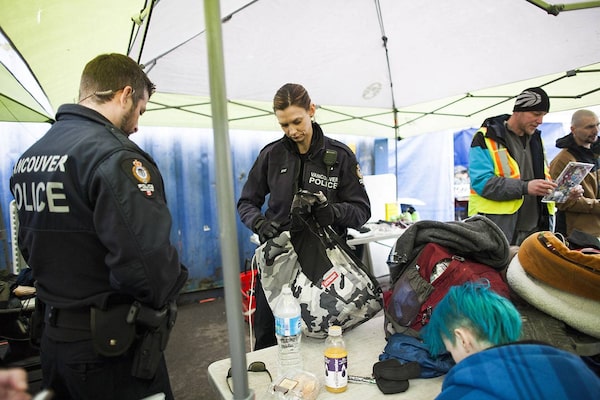
A Vancouver police officer searches a woman's bag without her consent and seizes her items at the DTES market on East Hastings Street in Vancouver, Thursday, February 15, 2018.Rafal Gerszak
An initiative that Vancouver Police say has reduced violent crime and recovered thousands of dollars' worth of stolen property in the city's Downtown Eastside has also ensnared local residents who have had items that were donated to them seized by officers.
Sarah Blyth is executive director of both the Overdose Prevention Society and the Downtown Eastside market, where many of the neighbourhood's low-income residents sell various goods for a small profit. In both her roles, she sources and receives a wide range of donations from businesses and individuals, such as clothing, toiletry items and pet supplies.
Many of these items are given to the low-income people who frequent the market, who can either keep the items for themselves or sell them. Ms. Blyth says this feeds the local economy and she encourages it. But in several recent instances, police officers have seized donated items that looked new.
Michael Van Seymour, 23, was stopped by police when he was trying to sell a handful of new dog collars he had received from Ms. Blyth.
"They came up to me and said, 'Where did you get those dog collars from?'" Mr. Seymour recalled. "I said, 'I got them from a lady at the market.' They said, 'Well they seem stolen to me, so we're going to take them. She can come down to the office and show us proof of receipts to get them back.' I just gave them over."
Legal advocates say such police action unfairly targets vulnerable populations who often give up their rights because they don't understand them. Anna Cooper, staff lawyer at Pivot Legal Society, said the burden is not on private citizens to prove that their belongings are not stolen.
"That's a ridiculous test which rightfully is not supported in law," she said. "The police must have a reasonable basis to believe a person's possessions are stolen or otherwise connected with a crime before they seize them. Simply having something new without a receipt doesn't meet this test."
Vancouver Police increased foot patrols in the low-income neighbourhood on Jan. 28 in response to what the department called a "significant increase in street disorder." Violent altercations had led to safety concerns, residents and business owners complained of not being able to access their buildings due to vendors and loiterers obstructing sidewalks and police said people from outside the city were coming into the area to sell drugs and stolen goods.
They displayed a sampling of seized goods: Four canisters of bear spray, two stolen bicycles and an assortment of hatchets, knives and replica firearms. Initial estimates suggest police recovered more than $20,000 of stolen property in just two weeks, Deputy Chief Chow said.
Shortly after police seized Mr. Seymour's dog collars, Ms. Blyth crossed passed with the same officers. The Globe and Mail has viewed video footage of Ms. Blyth telling them the collars were donated.
The officers eventually return the dog collars after Ms. Blyth produced text messages from the woman who donated them. Ms. Blyth said vulnerable residents are intimidated into giving up possessions that are rightfully theirs and few would bother going to police in an effort to retrieve them.
"People tend to give up their rights when they don't know what they are," she said.
Shane Bowlus, a vendor who also works as head of security for the market, recalled officers last week seizing from another vendor several new dress shirts that had been donated by a company that manages surplus merchandise.
Deputy Chief Chow said officers only seize items when there are reasonable grounds to believe they are stolen "based on the circumstances at hand."
"There are a lot of things and a lot of police tactics that we obviously wouldn't discuss openly in a forum like this," he said at the news conference, "but I can tell you it's not just by happenchance that our officers are coming across this stolen property."
Entrepreneurs, developers and more affluent residents have been moving into Vancouver’s notorious Downtown Eastside at an accelerating rate. Activist Fraser Stuart says the changes are displacing longer-term residents.
The Canadian Press
 Andrea Woo
Andrea Woo